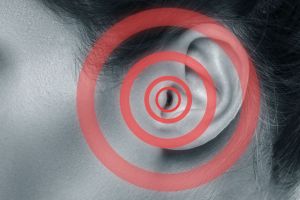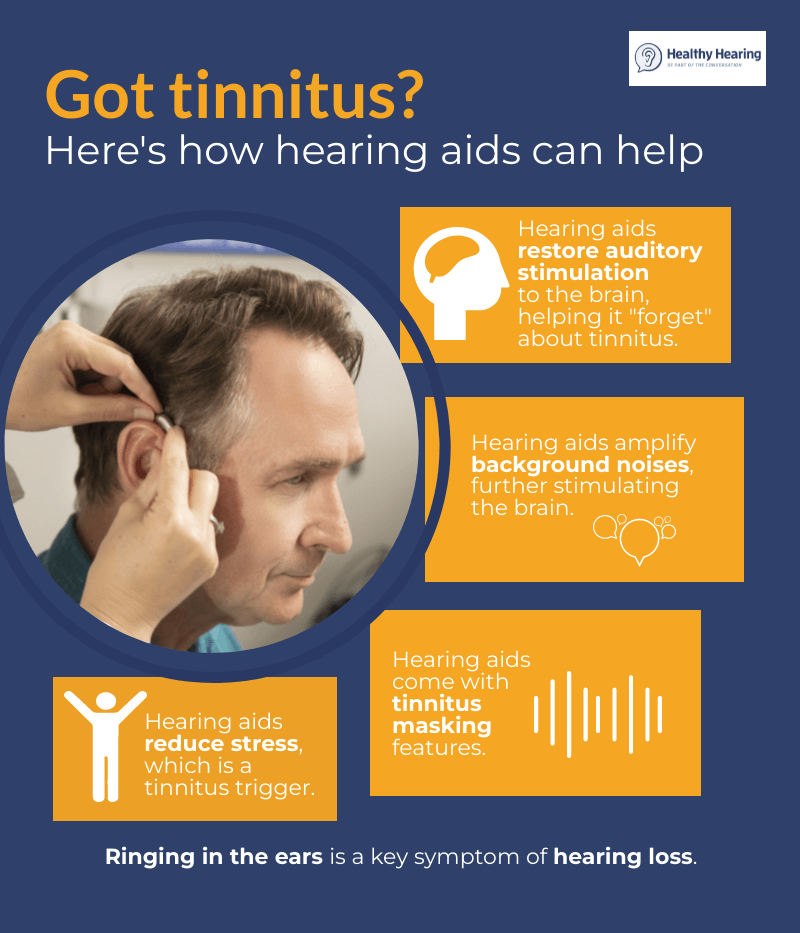|
www.HealthyHearing.com |
What is tinnitus?
By Joy Victory, managing editor, Healthy Hearing Last updated on: April 22nd, 2025 Understanding the risk factors, causes and treatments is important to managing tinnitus. Key points:
Tinnitus is defined as a ringing or buzzing in one or both ears. It's a common condition, with research estimating that about 15% of all adults worldwide will experience it at some point, according to a systematic review published in JAMA Neurology. That percentage increases to 25% in older adults. For some, their symptoms come and go and are more of a minor annoyance than anything. However, in severe cases, it can interfere with work, sleep and other daily activities. What does tinnitus sound like?While many people experience tinnitus as a ringing noise, others hear buzzing, hissing, whirring or other such sounds. It's more common to perceive tinnitus in both ears, however some only experience ringing in one ear or as a sound inside their head. It can be loud or soft, intermittent or steady. For some, tinnitus seems to get louder at night, just before sleep when no other sounds are competing with it. You may also experience tinnitus spikes where symptoms are worse for a few days or weeks before settling down again. 
it as a buzzing, whooshing, or ringing in the ears. The vast majority of tinnitus is subjective, meaning you can hear it, but other people can't. However there are some cases where a clinician may be able to hear it with a stethoscope as well. This is especially true for pulsatile tinnitus — a type of tinnitus where the sound in your ear pulses in time with your heartbeat. Because it can be a sign of an issue with your blood vessels, it’s important to see your doctor if you notice this symptom. Why do my ears ring?Tinnitus is not considered a disease by itself, but rather a symptom of another condition. Often times, the underlying cause of tinnitus is never discovered. However there are common risk factors, many of which are related to issues with the auditory system. They include, but are not limited to:
How can I stop my tinnitus?Although there’s no proven cure for tinnitus, there are many different treatments that help make it easier to ignore. Hearing aidsBecause so many sufferers also have hearing loss, properly fitted hearing aids can help tinnitus. Modern hearing aids not only come with tinnitus masking features, they also help "retrain" the brain to focus on desired sounds, known as sound therapy. Bringing sound back to your brain through the use of hearing aids may help distract it away from listening to your tinnitus. In other cases, tinnitus treatments can include medications. Habituation and other methodsAnother treatment option is called tinnitus retaining therapy (TRT), and it is designed to teach you to ignore the background ringing noise in the ear, known as habituation. In addition to counseling sessions, a white noise generator is used to create environmental sounds to make your tinnitus less noticeable.
Treating underlying conditionsFinding the cause of your tinnitus (or contributing factors) and treating those can help provide relief from your symptoms. Additionally, taking steps to improve your overall health by controlling your blood pressure, reducing stress and decreasing any food or drink that exacerbates the ringing in your ears can be helpful. Tinnitus and mental healthConstant buzzing in the ears can take a toll on your mental health. This is why tinnitus relief strategies often also include cognitive behavioral therapy, relaxation exercises, meditation and visualization. In rare cases, tinnitus can feel so overwhelming to your daily life that it may lead to suicidal thoughts. Find out more on why this happens, and what you can do about it by reading tinnitus and suicidal thoughts. Is it Meniere’s disease?Meniere’s disease isn’t directly connected to tinnitus, but people with Meniere’s often experience it, at least temporarily. Meniere's disease is an inner ear disease that typically only affects one ear. This disease can cause hearing loss, pressure or pain in the ear, severe cases of dizziness or vertigo and a ringing or roaring tinnitus. While Meniere’s isn’t fully understood, it appears that several relief options for tinnitus can also help with this disease. Patients are often advised to reduce stress and lower their consumption of caffeine and sodium. What if my doctor doesn't take me seriously?Tinnitus in and of itself is not life-threatening. However, because side effects can include mental distress, insomnia and other negative impacts, tinnitus should be taken seriously by your healthcare provider. If you feel your doctor is dismissing your tinnitus, seek a different provider. Mental health care can be an important part of proper tinnitus treatment, so contacting a therapist or psychiatrist also is recommended if tinnitus is making it hard to cope. There are many providers who specialize in helping patients cope with tinnitus. Getting help for tinnitusIf you are experiencing tinnitus, the first and most important step is to consult a hearing care professional for a comprehensive evaluation of your auditory system. Depending on your needs, your doctor may recommend seeing an audiologist who specializes in tinnitus care. Early intervention is key, and many effective management options are available to help you find relief. Visit our directory of hearing care providers to locate a clinic near you that offers tinnitus testing and support. Please note that not all hearing clinics provide tinnitus services, so you may wish to review several clinic profiles to find the best fit for your care. Joy Victory, managing editor, Healthy Hearing
You are reading about: Related topics More information about hearing loss, hearing aids, hearing aid brands and assistive devices. Featured clinics near me
Earzlink Hearing Care - Reynoldsburg Find a clinicNeed a hearing test but not sure which clinic to choose? Call 1-877-872-7165 for help setting up a hearing test appointment. Related contentThe Healthy Hearing Report |
|
www.HealthyHearing.com |
What is tinnitus?
By Joy Victory, managing editor, Healthy Hearing Last updated on: April 22nd, 2025 Understanding the risk factors, causes and treatments is important to managing tinnitus. |




 Joy Victory has extensive experience editing consumer health information. Her training in particular has focused on how to best communicate evidence-based medical guidelines and clinical trial results to the public. She strives to make health content accurate, accessible and engaging to the public.
Joy Victory has extensive experience editing consumer health information. Her training in particular has focused on how to best communicate evidence-based medical guidelines and clinical trial results to the public. She strives to make health content accurate, accessible and engaging to the public.